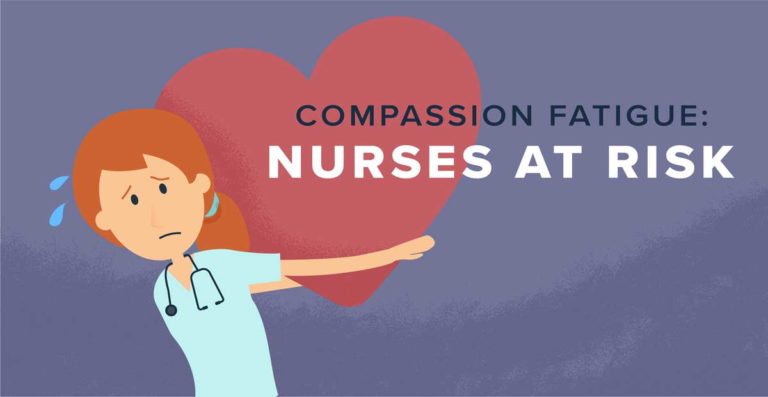Nurses tend to exude a lot of compassion when they’re on the job. They have to assist those that may be sick or injured, comfort their family members, and deal with all kinds of difficult, emotionally complex situations. This can lead to what’s known as compassion fatigue, a state of being in which a nurse’s emotions and physical health can deteriorate because of their repeated exposure to death and other emotionally overwhelming situations. That’s why every nurse should be aware of compassion fatigue, what it means, how it can affect a person’s health, and ways to combat it.
What Is Compassion Fatigue?
Compassion fatigue can be caused by a number of different factors. We often associate compassion fatigue with nurse burnout, and they are similar in many respects, but compassion fatigue plays more on a nurse’s emotions as they try to lead a normal, healthy lifestyle outside of work. Nurses that are exposed to a range of traumatic situations may start to take on some of these negative emotions they witness second-hand in patients and their family members. This can lead to negative thought patterns, feelings of hopelessness, and even less job satisfaction as death and suffering become an integral part of their work.
Compassion fatigue can extend into a nurse’s private life as well. They may start to obsess over their own health or the condition of those around them. They might lie awake a night thinking of patients that have lost their lives on their watch. This can even lead to physical symptoms, such as fatigue, restlessness, and added stress and anxiety. A nurse may find it difficult to break out of this pattern if they continue to witness and deal with emotional trauma on the floor.
What Does Compassion Fatigue Look Like?
When a nurse is struggling with compassion fatigue, they may start to lose focus while at work. They may re-live these traumatic events over and over again in their head, impairing their ability to concentrate on the task at hand. They may get less sleep, be more cranky or irritable on the floor, or lose their appreciation for nursing all together. Nurses and their managers should be on the lookout for these symptoms, so they can help their peers that might be struggling with compassion fatigue.
Who’s at Risk?
While every nurse can experience compassion fatigue at some point in their career, some nurses are more prone to this condition than others. Nurses that work in oncology or the ER might experience these symptoms more often than not because they see more patient deaths than the average nurse. Comforting those that have lost a loved one may be a daily occurrence. Nurses with sick loved ones may also be at a greater risk for compassion fatigue. If a nurse’s personal life becomes wrapped up in illness and disease, they will need a reprieve from this constant stress and despair.
Much like nurse burnout, nurses that continuously take extra shifts and miss their breaks can also be at a greater risk for compassion fatigue. Even though they have good intentions, every nurse needs to know when to stop and rest, or the quality of care they provide may start to deteriorate.
Ways to Combat Compassion Fatigue
It’s important for nurses to be aware of their emotions on the floor and when they’re not at work. Nurses cannot combat compassion fatigue if they are not aware of how the job affects their physical and emotional wellbeing.
-
Practice Self-Care
Nurses should always get in the habit of practicing self-care, regardless of whether they are experiencing compassion fatigue or not. This is a tough job and nurses need to learn how to take care of themselves. This includes taking time off once in a while, getting plenty of rest, eating a balanced diet, and not overworking themselves on the floor. Nurses need to find a way to relax and destress when they’re not at work.
-
Talk to a Supervisor or Colleague
If a nurse continues to struggle with compassion fatigue, they should talk to a supervisor or colleague about how they’re feeling. Their supervisor might rearrange their schedule to give them a break or direct them to the HR department for additional help and relief. The supervisor may also reassign them to another unit if being the ER or another department is taking a toll on their health.
-
Enforce Personal Boundaries
Some nurses can get too attached to their patients, which can lead to compassion fatigue. Nurses should try to set professional boundaries with their patients by being respectful and compassionate without getting too invested in a person’s life. They can also set boundaries with their loved ones by not talking about healthcare and health advice when they’re not at work.
Compassion fatigue can affect anyone in the healthcare industry. It’s important to know the signs, so nurses and their managers can have each other’s backs. Stay tuned to the Nursegrid blog for more healthcare news and advice.
